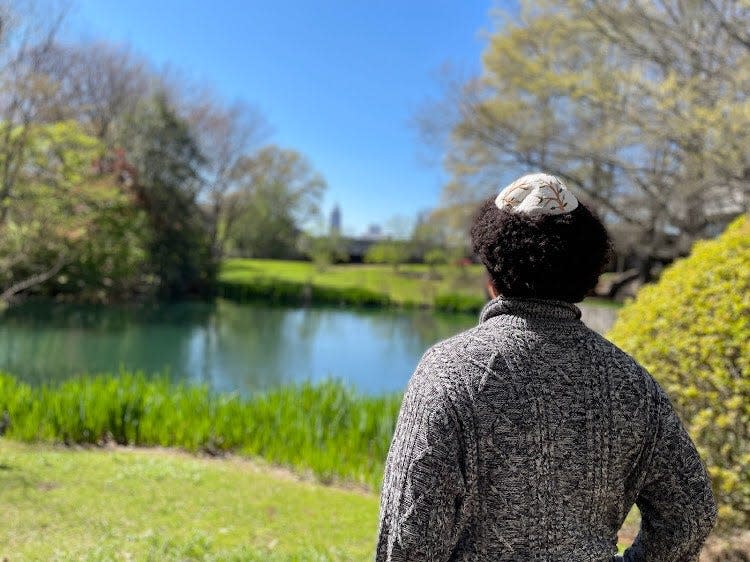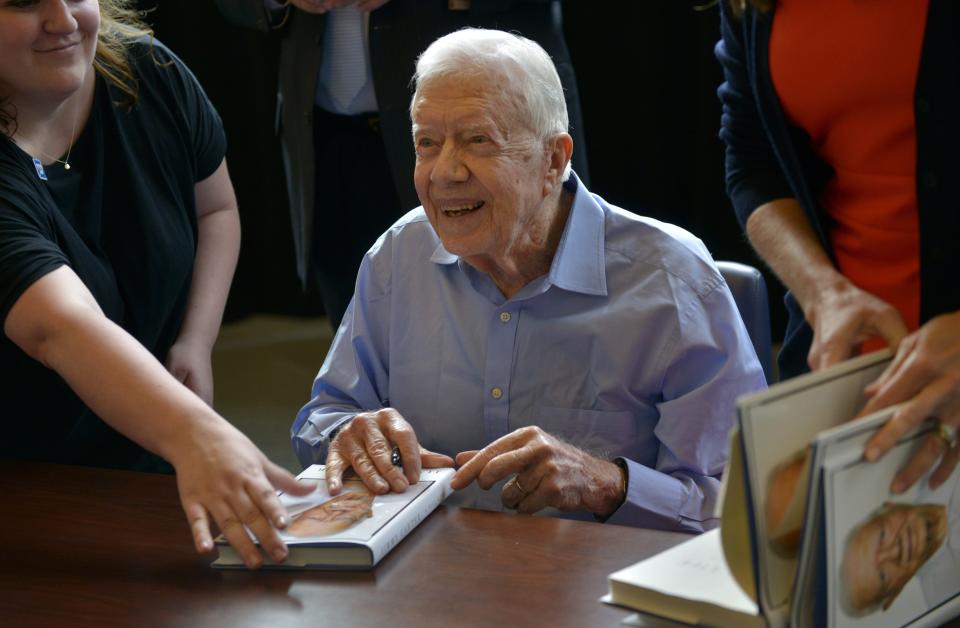Jimmy Carter believes Black lives matter. Would his decency be considered 'woke' today?
- Oops!Something went wrong.Please try again later.
The tulips and sunflowers reminded me of my grandmother's garden. Though I was in downtown Atlanta, I could vividly hear birds chirp.
During my vacation trip, I took time to visit the Jimmy Carter Presidential Library and Museum. I arrived at the center, in awe of the beauty on the campus.
With the recent announcement of Carter being placed in hospice, I felt called to the museum, to learn more about his uncommon decency.
I began the museum in its theater, watching a six-minute video narrated by actor Martin Sheen.
As I sat in the the theater, learning about Carter's humble beginnings in Plains, Georgia, two questions came in my mind. First, how much would it cost for Martin Sheen to narrate my documentary?
And second, what has decency become in our society?

In the video, Carter speaks of the conflict he had as a child, with his mother being a nurse who gladly helped both white and Black people but a father who was a firm segregationist.
Carter's decency is accompanied by the honesty and vulnerability to not only understand the complexities of race, but also realize the need to stay committed to equality for all Americans.
A lion at dusk: Jimmy Carter's greatest accomplishments have been in health and welfare
Carter channeled decency as action
In the museum, there's an exhibit featuring the Clarks, a Black family whom the Carters befriended. Little Jimmy Carter would spend nights with them, sleeping on a small potato sack stuffed with cotton.
Those nights with the Clarks and the friendships Carter made with other Black people carried with him throughout his political career. Carter exhibited decency while campaigning for the 1976 election as a common-man peanut farmer.
During Carter's time as Georgia's governor, he appointed 50 Black members to state boards and agencies. The number of Black state employees increased by 25%.
Carter took the time after his 1971 inauguration as Georgia's 76th governor to set a course for his state.
"I say to you quite frankly that the time for discrimination is over," Carter said. "No poor, rural, weak or Black person should ever have to bear the additional burden of being deprived of the opportunity of an education, a job or simple justice."
His words were surprising to the segregationists who had supported him in his career.
In the 1976 presidential election, 83% of Black voters showed up for Carter, giving the Democratic challenger much need support.
In a time where politics centered around segregation and integration, Carter channeled the values learned as a little boy spending the night at the Clarks. And he acted on it.
Mister Rogers lived a life of kindness: Would today's GOP try to ban him for being woke?
Uncommon decency is in all of us
I think of decency not as just a value but as an active remembrance of where you came. Walking through the Carter museum, gazing at the pond, I remembered that young kid picking Concord grapes off my grandmother's vine at her house in Winchester, Tennessee.
Our country struggles with defining "woke."
"Woke" to me is being aware of how social constructs affect people in every-day life, especially those who have been treated less than, such as people who are Black, LGBTQ+ or from other marginalized groups.
I fear that in today's society, those who act on their decency, like Carter, get labeled by some inept right-wingers as "woke," a bad word in their circle.

Carter's uncommon decency that led to a Nobel Prize-winning human rights campaign would be called woke in today's era because he truly believes Black lives matter – not just because Twitter or Target told him, but because Mrs. Clark made sure he had a place to stay when his parents were gone.
But as we struggle to decide what or who is "woke," it doesn't take too much thought to know what decency is.
I'd like to think Carter designed his presidential library to bring the decency out in everyone who journeyed there, to send them back to a peaceful time in hopes to replicate it.
LeBron Hill is an opinion columnist for the USA TODAY Network Tennessee and the curator of the Black Tennessee Voices newsletter and Instagram account. This column first published in the Nashville Tennessean.
This article originally appeared on Nashville Tennessean: Jimmy Carter's decency is political rarity. Why is that 'woke' today?

